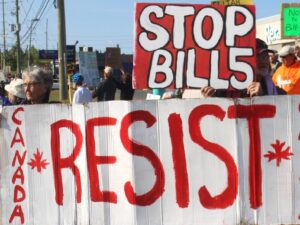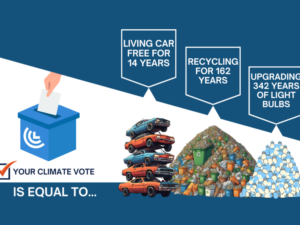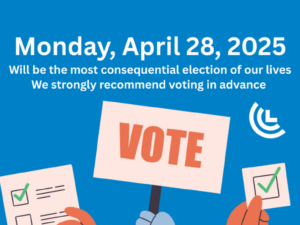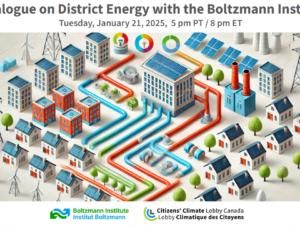Flooding is the number one risk facing Canadian homeowners. The following is basic physics: for every 1 C increase in temperature, there is a seven percent increase in air moisture, which leads to more rainfall. In the past couple of weeks, regions of Canada have been hit hard by flooding. Thousands have been forced to evacuate in B.C. in the Fraser Valley flooding. New Brunswick’s record-breaking floods are a jarring dose of climate reality. Although water levels have been falling, a new threat of contaminated water exists in New Brunswick. “Unless we can find the political will to rapidly reduce our GHG emissions by all possible means including carbon pricing, we will be rapidly locking in a near-future rife with new weather normals. The financial, human and planetary costs will be astronomical,” says Cathy Orlando, National Director of Citizens’ Climate Lobby Canada. Which specific carbon pricing policy does your party favour? Please highlight the policy’s major features What are your party’s GHG targets for 2020 and 2030? Will your party’s carbon price continue to rise past 2022? ####The Green Party of Ontario Responds to a Climate Action Counts Survey
FOR IMMEDIATE MEDIA RELEASE: May 14, 2018
Corrected version – our apologies
Media Contact: Cathy Orlando, cathy@citizensclimatelobby.org , 705-929-4043
On March 5, Citizens’ Climate Lobby sent a survey to the four major political parties in Ontario regarding their climate change policies. As of today, three of the four parties have responded to the survey. Throughout the week, we will be releasing the results of our survey. Here are the answers from the Green Party of Ontario.
The Green Party believes that a revenue-neutral carbon fee and dividend system is the most effective and fair carbon pricing policy. Under a carbon fee-and-dividend approach, a fee is levied at source on all goods and services that result in greenhouse gas pollution. This is returned directly to citizens as a dividend in the form of a cheque. The plan rewards people for reducing their carbon footprint. Most households – particularly those with modest to low incomes who generally consume less – will gain a net financial benefit from a carbon fee and dividend policy. A carbon fee and dividend is the simplest, most effective and fairest policy to price carbon pollution and reduce greenhouse gas emissions.
What is your party’s position to protecting those most vulnerable from rising commodity prices as the carbon price rises?
We also support returning all carbon price revenues to the people of Ontario through a regular dividend cheque. The fairest way to do this is through a carbon dividend – a cheque that returns revenue directly to the people of Ontario. Most households–particularly those with modest to low incomes who generally consume less–will gain a net financial benefit from a carbon fee and dividend policy.
Transitioning off fossil fuels will require ending all fossil fuel subsidies. In Ontario, fossil fuel subsidies are estimated at $600 million. Does your party agree to end fossil fuel subsidies in Ontario? If so, which ones and by when will your party end these subsidies?
End all fossil fuel subsidies by 2022 including: Reduced Tax Rate for Aviation Fuel, the Fuel Tax Exemption for Coloured Fuel, the Fuel Tax Reduction for Railway Diesel, Gasoline Tax Exemption for Methanol and Natural Gas, Gasoline Tax Reduction for Propane, Diesel Tax Refund for Auxiliary Equipment and Gasoline Tax Refund for Unlicensed Equipment.
We support a plan to set, review and report on five-year targets to reduce fossil fuel consumption to put Ontario on a path to becoming carbon neutral by 2050. Yes. We support a strong floor price with predictable increases.
What is your party’s position on industry and business free allocations from the cap and trade program?
We are opposed to the free pollution permits that have been offered by the current government to the largest 150 polluters. Free pollution permits should be available only to a small number of, especially vulnerable sectors. As well, any free allowances should be transitional and temporary so that everyone pays their fair share for the pollution that they create. We must learn from the experience of others: industry exemptions and free permits have weakened the effectiveness of the European Union cap and trade system. Allocating far fewer free permits would send a strong price signal and create more demand for low-carbon innovation.
Carbon pricing policies must be harmonized inter-provincially, territorially, nationally and finally, internationally. Border Tax Adjustments (BTAs) can be implemented by the Federal Government to protect Canadian industries from countries that currently do not have similar carbon pricing policies. What is your party’s position on the federal government using BTAs especially as the carbon price rises?
Border carbon adjustments are a useful tool to address competitiveness concerns and leakage risks. Since subnational governments like Ontario have limited legal authority to implement border carbon adjustments, we will work with the federal government to explore these mechanisms. The effective use of border carbon adjustments may eliminate the need to issue any free pollution permits.
What is your party’s approach to reducing methane emissions?
The Green Party of Ontario supports regulations to reduce methane emissions.
What is your party’s position on fracking?
The Green Party of Ontario is in favour of an immediate and indefinite ban on fracking in order to prioritize drinking water, public health, and climate stability.
MEDIA RELEASE: The Green Party of Ontario Responds to a Climate Action Counts Survey
Home » CCL Canada News » MEDIA RELEASE: The Green Party of Ontario Responds to a Climate Action Counts Survey
MEDIA RELEASE: The Green Party of Ontario Responds to a Climate Action Counts Survey
Posted on May 14, 2018 in Media Release













